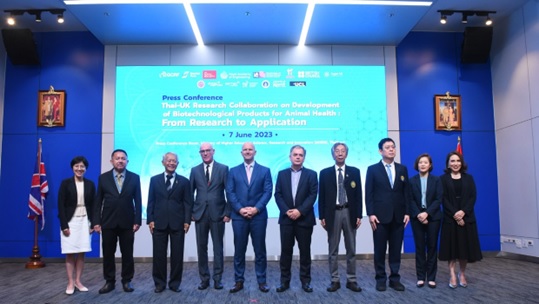
A press conference was held on 7 June 2023 announcing successful implementation of Thai-UK research collaboration on development of biotechnological products for animal health. The research collaboration, which has raised over THB 170 million in grants, focuses on two topics - animal vaccines and biopharmaceuticals and microalgal-based technology for shrimp disease control, with research partners including BIOTEC-NSTDA, King Mongkut’s University of Technology Thonburi (KMUTT), the University of Kent and University College London (UCL). The press conference was attended by Dr. Pasit Lorterapong, Deputy Permanent Secretary for Higher Education, Science, Research and Innovation; Mr. David Thomas, Deputy Head of Mission in British Embassy Bangkok; Prof. Dr. Yongyuth Yuthavong, Former Deputy Prime Minister; Assoc. Prof. Dr. Suvit Tia, KMUTT President; Dr. Theerayut Toojinda, BIOTEC Deputy Executive Director, and researchers involved in the projects.
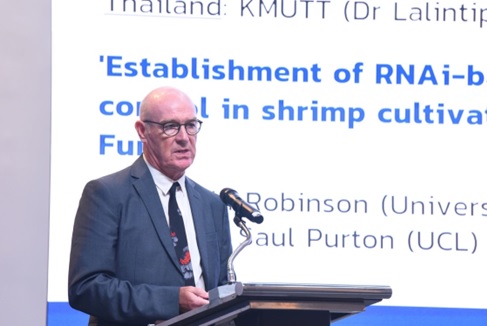
Prof. Dr. Colin Robinson of the University of Kent said that Thailand, along with its ASEAN neighbors, is the world’s major food producer, especially aquaculture and livestock. As global demand for food is rising, animal health management has become increasingly essential to ensure the sustainability of this important industry in ASEAN. It is therefore a strategic move for ASEAN to collaborate with developed countries like the UK on research and technology transfer to increase its capacity in animal health technology.
Microalgal-based platform for shrimp disease control
Over the past decade, the Thai shrimp industry has been hit with disease outbreaks caused by bacteria, viruses and parasites, resulting in as much as 60% production loss. These outbreaks also impact shrimp cultivation in the neighboring countries. Pathogens such as white spot syndrome virus (WSSV) and yellow head virus (YHV) continue to wreak havoc in the eastern and southern parts of Thailand.
The University of Kent, UCL and BIOTEC co-developed a microalgal-based platform for shrimp disease control, as a result of two projects. “Establishment of RNAi-based algal technology for sustainable disease control in shrimp cultivation” was funded by the Royal Society and Thailand Science Research Innovation (TSRI), and “Development of novel microalgal-based systems for shrimp disease control in South East Asia” received a research grant from the Royal Society.
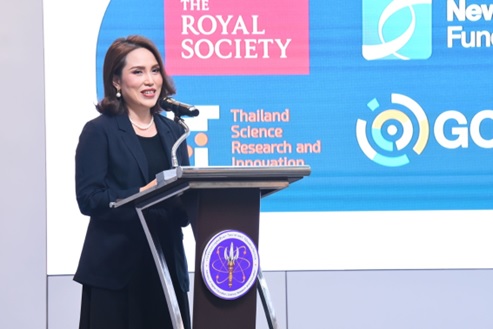
Dr. Vanvimon Saksmerprome, Leader of BIOTEC Fish and Shrimp Molecular Biology and Biotechnology Research Team, explained that the team developed microalgae expressing antiviral double-stranded RNA (dsRNA) as a feed supplement for shrimp offering viral protection. Feed trials showed that shrimp treated with this feed supplement has a 70% survival rate after exposing to WSSV, proven that this technology can help shrimp farmers in Thailand and ASEAN countries manage viral diseases.
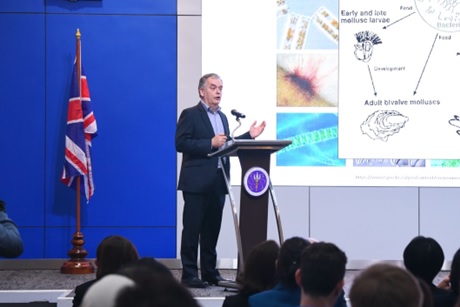
Prof. Saul Purton, Professor of Algal Biotechnology at UCL and Director of Algae-UK, said that the platform that the research team has created is highly accurate, yet simple and low cost and has potential to support sustainable shrimp farming.
Animal vaccines and biopharmaceuticals
Swine industry in Thailand, made up of over 150,000 farms, has constantly been impacted by viral diseases. While vaccination represents an effective tool to prevent and control pathogens, almost all swine vaccines in Thailand are imported, which not only are expensive, but can be less effective against local strains. To overcome these limitations, leading institutes in Thailand and the UK, namely the University of Kent, UCL, Imperial College, London School of Hygiene & Tropical Medicine, KMUTT and BIOTEC, teamed up to undertake two projects to strengthen Thailand’s infrastructure and workforce in biopharmaceutical and animal vaccine production. Funded by the Global Challenges Research Fund (GCRF), the 4.5-year project on “Establishment of Biopharmaceutical and Animal Vaccine Production Capacity in Thailand and Neighboring South East Asian Countries”, which lasted from 2017-2022, aims to establish state of the art facilities and technology for the production of recombinant proteins for human biosimilars and swine vaccine and biotherapeutics at affordable cost. The project on “Establishing a bioprocess workforce in Thailand to deliver affordable biological medicines through biomanufacturing education and industrial-research integration” was sponsored by the Royal Academy of Engineering, Newton Fund.
Dr. Peera Jaruampornpan, Leader of BIOTEC Virology and Cell Technology Research Team, reported that the research team has successfully developed a vaccine prototype for a subtype of porcine circovirus (PCV) 2, known as PCV2d, and the 30-L scale production. In addition, a study is being conducted to develop a production platform for recombinant interferon to be used as future broad-spectrum veterinary therapeutics.
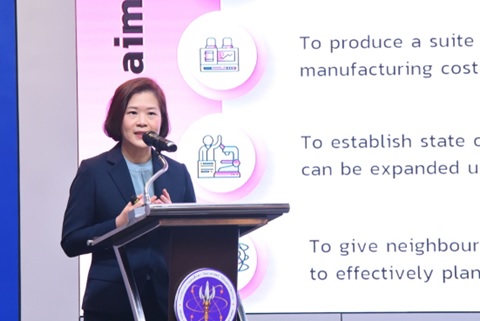
Asst. Prof. Dr. Lalintip Hocharoen of KMUTT added that KMUTT has been working with UCL to design and offer educational programs that provide practical training preparing workforce for the biopharmaceutical industry. A total of 270 personnel from 15 local and international public and private enterprises were trained in 2022.
